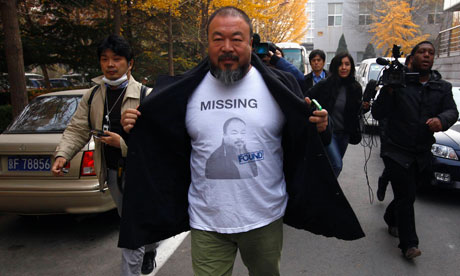By Irving Feng
Impunity Watch Reporter, Asia
BEIJING, China – A Chinese court upheld the decision to impose a 15 million yuan, roughly $2.4 million, tax fine against Ai Weiwei in an alleged attempt to silence the activist’s dissidence.

Ai has experienced a host of troubles with the Chinese government due to his activism including a three month detention last year. He was held without cause for 81 days, sparking international opposition to his detention because of the implications of a possible human rights violation.
Ai’s latest troubles, the tax fines imposed upon him and his company Beijing Fake Cultural Development Ltd, has gone through several appeals without any relief in sight. The latest appeal in the Chaoyang District Court was Ai’s last hope to overturn the Beijing tax agency’s tax fine.
Beijing Fake Cultural Development is the company which produces Ai Weiwei’s art and designs. The Beijing tax agency is alleging that the company owes millions in back taxes, and the tax fine was imposed due to the back taxes and past tax evasion perpetrated by the art firm. Throughout his five month long battle with the tax agency, Ai has denied all claims of owed back taxes and tax evasion by himself and his company.
Ai alleges that the Chinese legal system is “barbaric and backwater” because they have consistently failed to properly follow basic procedures and repeatedly denied him his legal rights. The court was required to notify Ai of its ruling in writing three days before the public announcement, but the only notification the court provided was a telephone call to Ai’s wife the day before the ruling was handed down. Ai also alleges that he has yet to see any of the evidence that supposedly proves his and his company’s guilt.
Ai’s passport was also confiscated during his three month detainment, and it has yet to be returned to him. The passport was supposedly set to be returned after Ai’s three month detainment in addition to a probationary period which ended in June. The delay has directly hindered Ai’s ability to work since he is unable to travel outside of the country to attend his exhibitions and other work obligations abroad in Washington, New York, and Berlin.
Ai and his supporters allege that the claims against him are complete fabrications brought by the government due to AI’s role as an outspoken critic of the government in China. He believes that the government is attempting to quell more of the rising dissidence in the country, using the inherently unfair justice system as its attack dog to silence any opposition.
Ai, however, says that this tax fine will do little to silence him. He has gotten thousands of donations from supporters to help him pay prior fines and expenses throughout his ordeal with the tax agency. Ai has also refused to pay the remainder of the tax fine claiming that the actions of the government are disgraceful and, perhaps, a clear violation of the basic rights of citizens.
For further information, please see:
BBC – China artist Ai Weiwei court challenge fails – 27 September 2012
The Guardian – Ai Weiwei loses appeal against $2.4m tax fine – 27 September 2012
International Business Times – Chinese court upholds fine against dissident Ai Weiwei – 27 September 2012
Reuters – Chinese court upholds fine against dissident Ai Weiwei – 27 September 2012
Taiwan News – China’s Ai Weiwei loses appeal against tax fine – 27 September 2012



